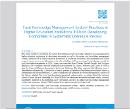| dc.contributor.author | Godfrey, Luyimbazi | |
| dc.contributor.author | Annabella, Habinka Ejiri | |
| dc.date.accessioned | 2024-02-05T10:26:24Z | |
| dc.date.available | 2024-02-05T10:26:24Z | |
| dc.date.issued | 2022 | |
| dc.identifier.citation | Godfrey, L., & Ejiri, A. H. (2022). Tacit Knowledge Management System Practices in Higher Education Institutions (HEIs) in Developing Economies: A Systematic Literature Review. | en_US |
| dc.identifier.uri | https://hdl.handle.net/20.500.12504/1593 | |
| dc.description.abstract | This study sought to investigate the factors that
influenced tacit knowledge retention and
management in higher education institutions in
developing economies as well as the extant tacit
knowledge management systems applied/used in
higher education institutions in developing
economies. The penultimate aim of this research
was to serve as an affirmative study whose
findings shall serve as input to developing a
model for tacit knowledge management in HEIs.
Papers were searched from Elsevier, Emerald
Insight, and ProQuest databases. The systematic
protocol combined ideas presented by Jesson,
Matheson and Lacey; as well as ideas
by Nunes, McPherson, Annansingh, Bashir and
Patterson. The latter suggested the following
steps: 1. Identification of keywords; 2.
Production of search queries; 3. Definition of
inclusion and exclusion criteria 4. Identification
of relevant databases; 5. Query of databases and
selection of relevant documents; 6. Analysis of
the dataset selected. The term ‘tacit knowledge’
generated 41,810 articles. 23 articles fitted the
inclusion criteria. Causes for tacit knowledge loss
from HEIs in low-developed economies included:
death, burnout, uncertainty, mistrust in the
institution, early retirement, and flaws in extant
tacit knowledge management systems and
processes. Various TKM frameworks in various
contexts have been tried. Few were found to
specifically address TKM in HEIs. Essential
factors were: individual/personal factors,
institutional environment factors, institutional
management practice factors; and factors
relating to institutional culture. Systems that
were employed to manage tacit knowledge in
HEIs were found to be piecemeal. The study thus
highlights the status of TKM in HEIs in
developing economies. | en_US |
| dc.language.iso | en | en_US |
| dc.publisher | London journal of research in humanities and social sciences | en_US |
| dc.subject | Tacit knowledge | en_US |
| dc.subject | Tacit knowledge management systems | en_US |
| dc.subject | Higher education institutions | en_US |
| dc.subject | Low- income-countries | en_US |
| dc.subject | Low middle income countries | en_US |
| dc.subject | Upper middle income countries | en_US |
| dc.title | Tacit knowledge management system practices in higher education institutions (HEIs) in developing economies: a systematic literature review | en_US |
| dc.type | Article | en_US |

